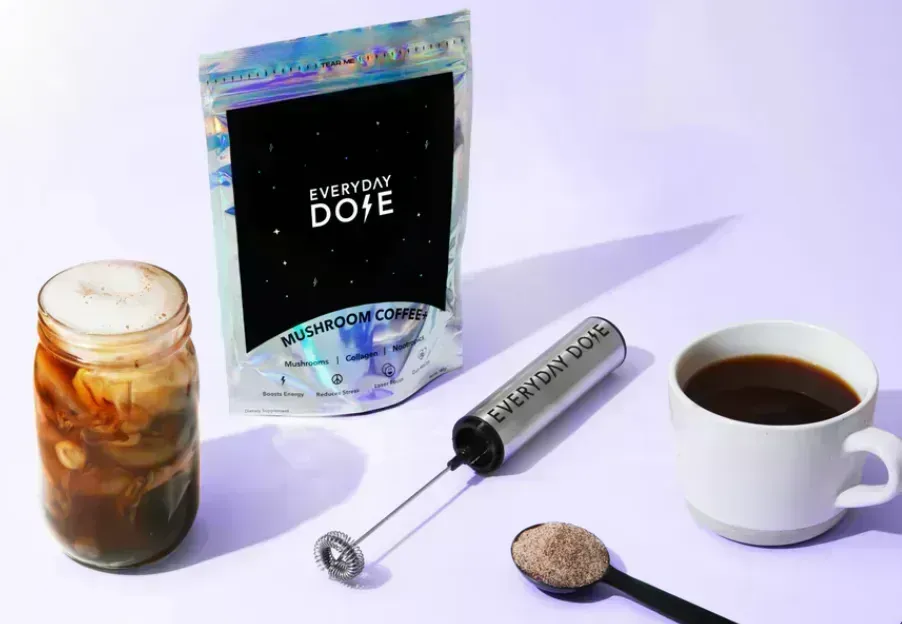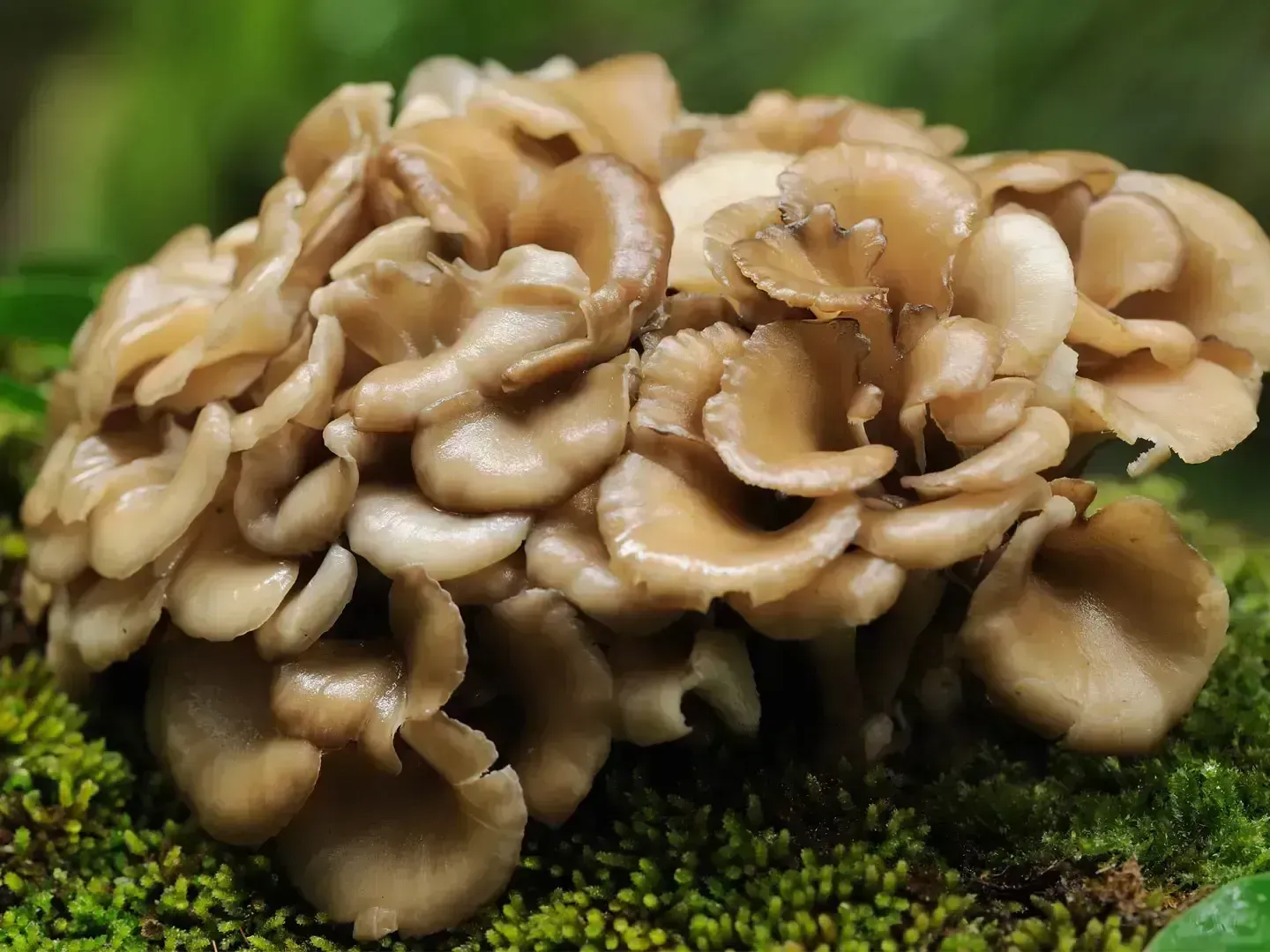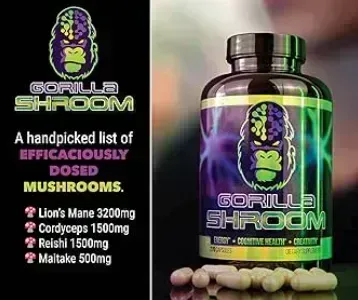In the world of natural remedies, functional mushrooms are carving out a niche for themselves as powerful allies for brain health. These fungi are celebrated not only for their culinary uses but also for their ability to enhance cognition, support memory, and protect the brain against age-related decline. From ancient herbal traditions to modern nootropic enthusiasts, mushrooms have captured the imagination of those looking to improve their mental performance naturally. Whether you’re a student, a professional, or someone looking to preserve cognitive function, these mushrooms might be your next brain-boosting secret.
Here, we explore the best mushrooms for brain health, their benefits, and how to incorporate them into your daily routine for optimal results.
Mushrooms for Brain: 1. Lion’s Mane (Hericium erinaceus)
Lion’s Mane is perhaps the most well-known mushroom for cognitive enhancement. Its shaggy, white appearance resembles a lion's mane mushroom, and its benefits for the brain are just as striking. Revered in traditional Chinese medicine for centuries, this mushroom is now backed by modern science as a potent ally for the nervous system. The medicinal properties of Lion’s Mane, including its neuroprotective effects and cognitive enhancements, make it a valuable natural remedy for mental health issues.
What is Lion’s Mane Mushroom?
Lion’s Mane Mushroom, also known as Hericium erinaceus, is a fascinating edible medicinal mushroom that has been cherished in traditional medicine for centuries. Native to North America, Europe, and Asia, this mushroom is easily recognizable by its unique appearance—a cascading mass of long, white spines that resemble a lion’s mane. Beyond its striking looks, Lion’s Mane is packed with bioactive compounds such as polysaccharides, polyketides, and terpenoids. These compounds are known for their impressive health benefits, making Lion’s Mane a valuable addition to the world of medicinal mushrooms.
Benefits:
-
Neurogenesis Support: Lion’s Mane stimulates the production of Nerve Growth Factor (NGF), a protein essential for the growth, maintenance, and survival of nerve cells. This support for neural regeneration makes it a standout for long-term cognitive health.
-
Memory and Focus: Research suggests it may improve cognitive function, particularly in older adults with mild cognitive impairment. Anecdotal evidence also points to its potential in boosting short-term memory and attention span. Lab and animal studies support these findings, indicating benefits for cognitive function and neuroprotection.
-
Protection Against Neurodegenerative Diseases: Research indicates its potential to protect against Alzheimer’s and Parkinson’s diseases by reducing inflammation, oxidative stress, and the buildup of amyloid-beta plaques.
How to Use:
-
Supplements: Capsules and powders are popular, offering a concentrated dose. Look for products that specify the use of fruiting bodies for maximum potency.
-
Culinary Uses: Add fresh or dried Lion’s Mane to soups, stir-fries, or teas. Fresh mushrooms, with their distinctive textures and flavors, enhance the umami profile of savory dishes, making them a delightful and nutritious addition to your diet.
2. Reishi (Ganoderma lucidum)
Known as the “Mushroom of Immortality,” Reishi is celebrated for its adaptogenic properties, helping the body manage stress—a crucial factor in maintaining brain health. Additionally, Reishi supports heart health by being low in sodium and fat, which can help manage blood pressure. Its calming effects make it a favorite among those looking to reduce mental fatigue and enhance clarity.
Benefits: Brain Health
-
Stress Reduction: Reishi helps regulate the body’s stress response, which can improve focus and mental clarity. Lower cortisol levels are associated with better cognitive performance.
-
Neuroprotection: It’s rich in antioxidants, which combat oxidative damage in the brain, preserving cognitive function as we age.
-
Improved Sleep: Reishi promotes relaxation and better sleep, indirectly supporting cognitive function by allowing the brain to recover and repair during rest.
How to Use:
-
Teas and Tinctures: Brew Reishi slices into a calming tea or use tinctures for convenience. Combining it with honey or ginger enhances its flavor.
-
Powder: Add Reishi powder to smoothies, protein shakes, or coffee alternatives for a daily dose of calm and focus.
3. Cordyceps (Cordyceps militaris and Cordyceps sinensis)
While Cordyceps is often associated with energy and endurance, it also has notable benefits for brain health. This unique mushroom has been a staple in traditional Tibetan medicine, known for boosting vitality and combating fatigue.
Benefits:
-
Enhanced Oxygen Utilization: Cordyceps improves oxygen delivery to the brain, boosting mental stamina and focus, especially during demanding tasks.
-
Anti-Fatigue Properties: By reducing fatigue, it supports sustained mental performance. This makes it ideal for long study sessions or high-pressure workdays.
-
Neuroprotection: Its antioxidant properties help shield the brain from damage, ensuring long-term cognitive health. Lab and animal studies support these findings, indicating potential benefits for cognitive function and neuroprotection.
How to Use:
-
Capsules: A convenient way to get a standardized dose. Opt for products that highlight lab-grown Cordyceps militaris for sustainability.
-
Coffee Blends: Many mushroom coffee brands include Cordyceps for its energy-boosting effects, providing a jitter-free alternative to traditional coffee.
4. Chaga (Inonotus obliquus)
Chaga is a powerful adaptogen that supports overall health, including brain function. Its rich nutrient profile and antioxidant content make it a standout among medicinal mushrooms.
Benefits:
Anti-Inflammatory Effects: Chronic inflammation is linked to cognitive decline, and Chaga helps combat this with its potent anti-inflammatory compounds. The medicinal properties of Chaga, including its neuroprotective effects and cognitive enhancements, make it a valuable natural remedy for mental health issues.
Antioxidant Powerhouse: Rich in antioxidants, it protects brain cells from oxidative stress, promoting overall brain health.
Immune Support: A healthy immune system indirectly benefits the brain by reducing systemic inflammation, which can impair cognitive function.
How to Use:
-
Tea: Brew Chaga chunks into a dark, rich tea. For added flavor, mix with cinnamon or vanilla.
-
Powder: Add to smoothies, lattes, or mix with other mushroom powders for a comprehensive cognitive boost.
5. Turkey Tail (Trametes versicolor)
Though primarily known for its immune-boosting properties, Turkey Tail also supports gut health—and by extension, brain health. Its medicinal properties include neuroprotective effects and cognitive enhancements, making it a valuable natural remedy for mental health issues. With the gut-brain axis playing a significant role in mental well-being, this mushroom offers indirect yet powerful benefits.
Benefits:
-
Gut-Brain Connection: Turkey Tail promotes a healthy microbiome, which is closely linked to cognitive function. A balanced gut can improve mood, focus, and memory.
-
Antioxidant Support: Protects against oxidative stress in the brain, which can lead to neurodegeneration.
How to Use:
-
Extracts: Turkey Tail extracts are easy to add to your routine. Choose hot water or dual-extracted products for maximum efficacy.
-
Teas: Brew into a mild, earthy tea for daily use. Pairing it with lemon or mint can enhance its taste.
6. Shiitake (Lentinula edodes)
Shiitake mushrooms, widely used in cooking, are also beneficial for brain health. They support heart health by being low in sodium and fat, which can help manage blood pressure. Their rich umami flavor and nutritional profile make them a versatile addition to both your diet and cognitive wellness routine.
Benefits:
-
B Vitamins: High in B vitamins, Shiitake supports energy production and neurotransmitter function, essential for mental clarity.
-
Anti-Inflammatory: Reduces inflammation that can impair cognitive function, making it a valuable addition to any brain-boosting diet.
How to Use:
-
Cooking: Incorporate into dishes like stir-fries, soups, and salads. Their savory taste complements a variety of cuisines.
-
Powders: Use in broths, sauces, or smoothies for a concentrated boost. Mushroom powders are especially convenient for busy lifestyles.
Potential Side Effects and Interactions
While Lion’s Mane Mushroom is generally safe for consumption, it’s important to be aware of potential side effects and interactions:
-
Allergic Reactions: Some individuals may experience allergic reactions to Lion’s Mane, including symptoms like hives, itching, and difficulty breathing. If you have a known mushroom allergy, exercise caution.
-
Interactions with Medications: Lion’s Mane may interact with certain medications, such as blood thinners and diabetes medications, increasing the risk of bleeding or hypoglycemia. Always consult with a healthcare provider if you are on medication.
-
Gastrointestinal Side Effects: Some people might experience gastrointestinal issues like nausea, vomiting, and diarrhea when consuming Lion’s Mane. Starting with a small dose can help mitigate these effects.
Seeking Professional Advice
If you’re considering using mushrooms for its brain health benefits, it’s wise to seek professional advice from a qualified healthcare practitioner. They can assist you in:
-
Determining the Best Dosage: The optimal dosage for brain health benefits is not well established. A healthcare practitioner can help tailor the dosage to your individual needs.
-
Monitoring for Side Effects: Regular check-ins with a healthcare provider can help monitor for any potential side effects or interactions, ensuring your treatment plan remains safe and effective.
-
Combining with Other Therapies: Lion’s Mane can be part of a comprehensive brain health strategy, including cognitive training and lifestyle modifications. A healthcare practitioner can help you develop a holistic treatment plan that maximizes the benefits of this medicinal mushroom.
By incorporating Lion’s Mane Mushroom into your routine with professional guidance, you can safely enjoy its numerous health benefits and support your brain health effectively.
Tips for Incorporating Medicinal Mushrooms into Your Routine
-
Start Small: If you’re new to medicinal mushrooms, begin with one type and gradually incorporate others. This approach allows you to monitor how each one affects you. Certain mushrooms, like Lion’s Mane, have shown potential in reducing symptoms associated with Alzheimer's disease by reducing oxidative stress and improving memory.
-
Consistency is Key: Regular use is necessary to experience long-term cognitive benefits. Consider making mushrooms a staple in your daily routine.
-
Combine with Other Nootropics: Pair mushrooms with other brain-boosting foods like green tea, omega-3s, or turmeric for enhanced effects. These combinations can amplify their benefits.
-
Experiment with Recipes: From teas to baked goods, there are countless ways to enjoy functional mushrooms. Get creative and find what works best for your taste and lifestyle.
-
Consult a Professional: If you have underlying health conditions or take medications, consult a healthcare provider before starting mushroom supplements to ensure safety and compatibility.
Final Thoughts
Functional mushrooms are a natural, effective way to support brain health. From boosting memory and focus to protecting against age-related decline, these fungi offer a wide range of cognitive benefits. By incorporating Lion’s Mane, Reishi, Cordyceps, and other mushrooms into your routine, you can take a step toward improved mental clarity and long-term brain health.
Ready to unlock the power of mushrooms? Start experimenting with these brain-friendly fungi today and reap the rewards of sharper cognition, reduced stress, and better overall well-being. With consistency and the right choices, you can harness the wisdom of nature to support your brain’s full potential.





